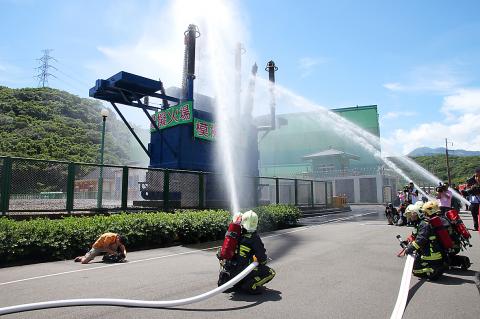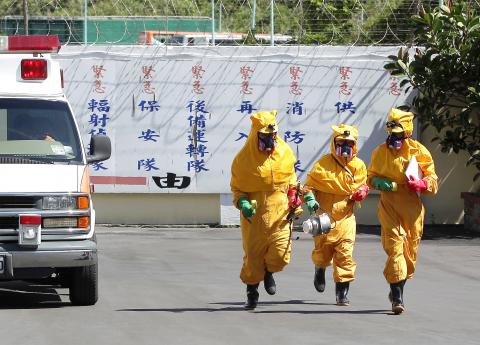The government will look into issues raised by environmentalists and residents of Lanyu (蘭嶼) — also known as Orchid Island — over abnormally high radiation levels alleged to be found on the island, which has been used as a nuclear disposal site since 1980s, Premier Sean Chen (陳冲) said yesterday.
Chen said he had talked to Atomic Energy Council Minister Tsai Chuen-horng (蔡春鴻) about the issue on Monday after seeing it in news reports.
A group of Japanese academics recently said that soil samples from Lang-Tao Elementary School on Lanyu showed abnormally high levels of radioactive iodine — well above natural background levels and 30 times higher than those recorded in other areas of the campus.

Photo: CNA
School principal Hu Lung-hsiung (胡龍雄) commissioned the group of Japanese professors of medicine and anthropology to conduct the study amid long-term concern among residents about exposure to high levels of radiation from the nuclear waste stored on the island.
The study was expected to be completed and published within a month.
Chen, who was attending a security drill at the Jinshan Nuclear Power Plant in New Taipei City’s (新北市) Shimen District (石門), told reporters he had asked the council to verify the information provided by the Japanese experts.

Photo: Pichi Chuang, REUTERS
After the inspection, Chen said that the government had applied “stringent stress tests” during the exercise to ensure the plant’s safety and security under all types of natural disaster scenarios.
Chen also addressed the issue of how much nuclear energy should account for the nation’s energy sources, saying it was a “matter of choice,” adding that Taiwanese remain divided over whether the country should move toward a low-carbon society or a nuclear-free homeland.
“No matter what we choose, our unwavering stance is to enhance the safety of nuclear power generation in the country,” Chen said.

ALIGNED THINKING: Taiwan and Japan have a mutual interest in trade, culture and engineering, and can work together for stability, Cho Jung-tai said Taiwan and Japan are two like-minded countries willing to work together to form a “safety barrier” in the Indo-Pacific region, Premier Cho Jung-tai (卓榮泰) yesterday said at the opening ceremony of the 35th Taiwan-Japan Modern Engineering and Technology Symposium in Taipei. Taiwan and Japan are close geographically and closer emotionally, he added. Citing the overflowing of a barrier lake in the Mataian River (馬太鞍溪) in September, Cho said the submersible water level sensors given by Japan during the disaster helped Taiwan monitor the lake’s water levels more accurately. Japan also provided a lot of vaccines early in the outbreak of the COVID-19 pandemic,

Kaohsiung Mayor Chen Chi-mai (陳其邁) on Monday announced light shows and themed traffic lights to welcome fans of South Korean pop group Twice to the port city. The group is to play Kaohsiung on Saturday as part of its “This Is For” world tour. It would be the group’s first performance in Taiwan since its debut 10 years ago. The all-female group consists of five South Koreans, three Japanese and Tainan’s Chou Tzu-yu (周子瑜), the first Taiwan-born and raised member of a South Korean girl group. To promote the group’s arrival, the city has been holding a series of events, including a pop-up

TEMPORAL/SPIRITUAL: Beijing’s claim that the next Buddhist leader must come from China is a heavy-handed political maneuver that will fall flat-faced, experts said China’s requirement that the Dalai Lama’s reincarnation to be born in China and approved by Beijing has drawn criticism, with experts at a forum in Taipei yesterday saying that if Beijing were to put forth its own Dalai Lama, the person would not be recognized by the Tibetan Buddhist community. The experts made a remarks at the two-day forum hosted by the Tibet Religious Foundation of His Holiness the Dalai Lama titled: “The Snow Land Forum: Finding Common Ground on Tibet.” China says it has the right to determine the Dalai Lama’s reincarnation, as it claims sovereignty over Tibet since ancient times,

Temperatures in some parts of Taiwan are expected to fall sharply to lows of 15°C later this week as seasonal northeasterly winds strengthen, the Central Weather Administration (CWA) said today. It is to be the strongest cold wave to affect northern Taiwan this autumn, while Chiayi County in the southwest and some parts of central Taiwan are likely to also see lower temperatures due to radiational cooling, which occurs under conditions of clear skies, light winds and dry weather, the CWA said. Across Taiwan, temperatures are to fall gradually this week, dropping to 15°C to 16°C in the early hours of Wednesday